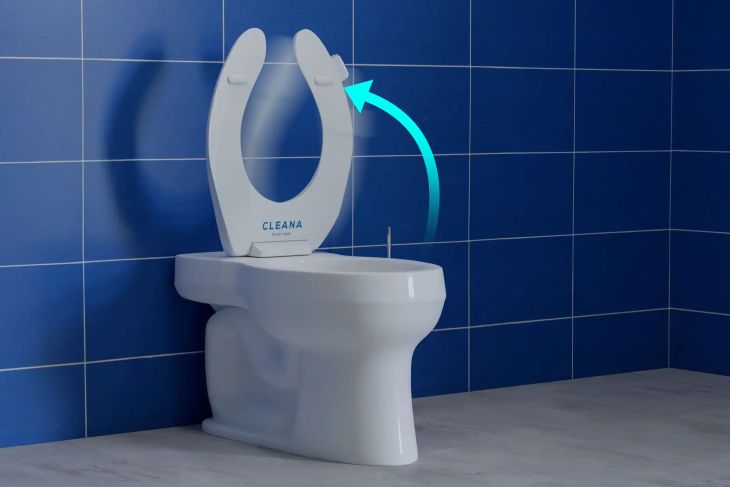We’ve all had the unpleasant experience of walking into a bathroom to discover a messy toilet seat. Now, an MIT alumni-founded startup is working to flush away that problem forever.
Cleana, co-founded by CTO Richard Li SM '24, has developed an antibacterial, self-lifting toilet seat that promises a cleaner, more hygienic bathroom experience for all. Developing a new toilet seat is not quite as sexy as creating a fusion reactor, but Li believes in the importance of the company’s mission.
“A lot of people find it odd at first — a lot of our investors certainly did,” Li says. “This is meaningful to me and how I spent my time the past four years at MIT, and we now have the best solution available for solving this big problem.”
About 1,000 of Cleana’s seats have already been installed in schools, airports, gyms, and stadiums. Customers include Gillette Stadium, the YMCA, and even MIT, which has purchased several of the self-raising sensations for use on campus.
“Everyone who’s had to use a dirty toilet before knows how big a problem they are,” Li says. “Everyone is aware of it, but nobody has been able to address it in a simple, elegant way.”
Li’s foray into the toilet revolution began at the height of the Covid-19 pandemic, when he was a master’s student in MIT’s Department of Mechanical Engineering and germs were top-of-mind for everyone.
In 2020, Li connected with Cleana co-founders Kevin Tang, Max Pounanov, and Andy Chang, who were students at Boston University, and the quest to give the toilet seat autonomy began. Li began by prototyping devices in MIT’s Sidney-Pacific dormitory and MIT D-Lab, working with hand tools, heavy machinery, and 3D printers to test different designs.
There were a number of moments that tested the founders’ commitment to the toilet revolution. Li spent many nights — when public toilets weren’t in use — touring bathrooms around Boston and disassembling hundreds of seats to test the fit of Cleana’s product on different toilet bowls. In a testament to the importance of market research, the founders stood outside the bathroom of a local bowling alley with an installed unit, and attempted to interview users about their experience.
Early feedback, while perhaps awkward, was also encouraging: Cleana’s toilet seats were consistently reported as far cleaner and drier than their standard counterparts. In fact, a months-long study across several sites found that it prevented nearly 95 percent of common toilet seat messes in bathrooms where it was deployed.
“It wasn’t a pleasant experience, but it did get us the data we needed,” Li laughs.
Cleana’s smart seat looks a lot like a regular toilet seat with a special handle — but don’t let the standard design fool you; creating Cleana’s seat was a more complex challenge than it may first appear. The company couldn’t just use a set of springs to lift the seat up immediately (which could cause wiping interference, among other issues we won’t detail here). Cleana ultimately went through three major design pivots before settling on today’s product.
Cleana’s current seat is battery-free and in fact uses no electronics. It lifts mechanically after a predetermined amount of time, thus removing it from areas prone to common messes. Importantly, the seat detects when an individual is using the seat and utilizes a clever system to adjust when it should lift itself.
Cleana’s seat especially shines in public men’s and all-gender restrooms, where negligent behavior results in a considerable amount of splatter. The seat also incorporates antimicrobial agents to prevent the spread of germs, and its special handle spares users from having to touch the rest of the seat.
Customers have reported fewer toilet seat messes and less maintenance with Cleana’s seats.
“It saves the cleaning staff a lot of time,” Li says. “Sometimes, businesses had to send cleaning staff into their bathrooms multiple times a day to check on the toilet seat to make sure it’s clean. Now they’re finding that every time they go in, it’s already clean.”
The team is also creating a premium version of the seat geared toward the home, that automatically lowers the toilet seat and lid instead of lifting it. The product uses the same technology as its commercial seat, simply flipped around. The invention aims to end the age-old debate over lowering the toilet seat, while also protecting young children, pets, or dropped items from the risks of an open bowl.
“It’s funny developing a second product which is essentially the opposite of our first, but we’ve been absolutely blown away by the interest in it, especially amongst homeowners and developers,” said Li. “Several large plumbing companies with interest in the product have also conducted independent surveys, finding that more than half of consumers may adopt them in the coming years.”
Ultimately, Li wants to get to a point when he can go into any random gas station or restaurant, and, when nature calls, find his company’s smart seat waiting for him. That dream got real on a recent trip to the Roche Brothers in Watertown, Massachusetts, when Li was delighted to discover his sparkling seat in the restroom by chance.
But Li knows Cleana’s team still has a long way to go before the toilet revolution is complete. That’s why this past spring, when Li finally stood to collect his diploma at MIT’s Commencement, he wore not a sash around his neck, but a toilet seat.
Others kept their distance, but Li knew it was clean.















